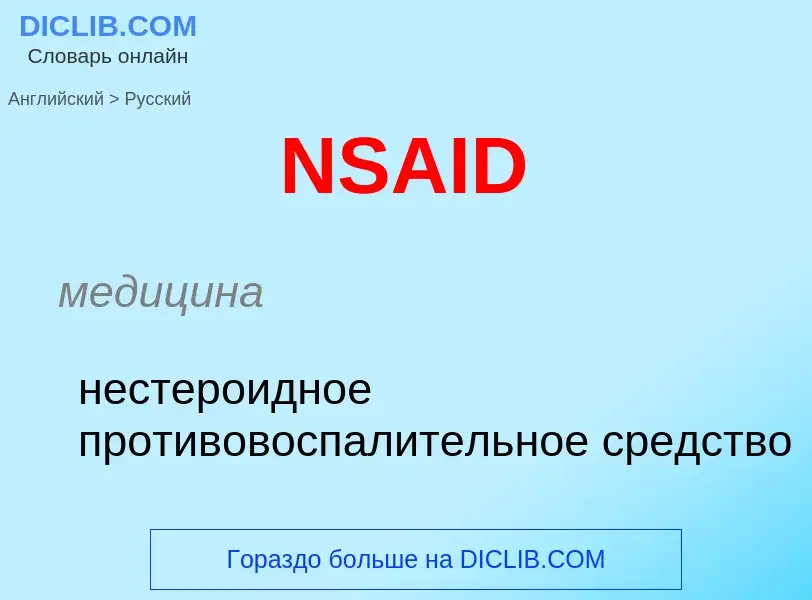ترجمة وتحليل الكلمات عن طريق الذكاء الاصطناعي ChatGPT
في هذه الصفحة يمكنك الحصول على تحليل مفصل لكلمة أو عبارة باستخدام أفضل تقنيات الذكاء الاصطناعي المتوفرة اليوم:
- كيف يتم استخدام الكلمة في اللغة
- تردد الكلمة
- ما إذا كانت الكلمة تستخدم في كثير من الأحيان في اللغة المنطوقة أو المكتوبة
- خيارات الترجمة إلى الروسية أو الإسبانية، على التوالي
- أمثلة على استخدام الكلمة (عدة عبارات مع الترجمة)
- أصل الكلمة
NSAID - ترجمة إلى الروسية
медицина
нестероидное противовоспалительное средство
медицина
нестероидное противовоспалительное средство
ويكيبيديا
Non-steroidal anti-inflammatory drugs (NSAID) are members of a therapeutic drug class which reduces pain, decreases inflammation, decreases fever, and prevents blood clots. Side effects depend on the specific drug, its dose and duration of use, but largely include an increased risk of gastrointestinal ulcers and bleeds, heart attack, and kidney disease.
The term non-steroidal, common from around 1960, distinguishes these drugs from corticosteroids, which during the 1950s had acquired a bad reputation due to overuse and side-effect problems after their initial introduction in 1948.
NSAIDs work by inhibiting the activity of cyclooxygenase enzymes (the COX-1 and COX-2 isoenzymes). In cells, these enzymes are involved in the synthesis of key biological mediators, namely prostaglandins, which are involved in inflammation, and thromboxanes, which are involved in blood clotting.
There are two general types of NSAIDs available: non-selective, and COX-2 selective. Most NSAIDs are non-selective, and inhibit the activity of both COX-1 and COX-2. These NSAIDs, while reducing inflammation, also inhibit platelet aggregation and increase the risk of gastrointestinal ulcers and bleeds. COX-2 selective inhibitors have fewer gastrointestinal side effects, but promote thrombosis, and some of these agents substantially increase the risk of heart attack. As a result, certain older COX-2 selective inhibitors - such as celecoxib and rofecoxib - are no longer used due to the high risk of undiagnosed vascular disease. These differential effects are due to the different roles and tissue localisations of each COX isoenzyme. By inhibiting physiological COX activity, all NSAIDs increase the risk of kidney disease and, through a related mechanism, heart attack. In addition, NSAIDs can blunt the production of erythropoietin, resulting in anaemia, since haemoglobin needs this hormone to be produced.
The most prominent NSAIDs are aspirin, ibuprofen, and naproxen; all available over the counter (OTC) in most countries. Paracetamol (acetaminophen) is generally not considered an NSAID because it has only minor anti-inflammatory activity. Paracetamol treats pain mainly by blocking COX-2 and inhibiting endocannabinoid reuptake almost exclusively within the brain, and only minimally in the rest of the body.

![One of the first advertisements for Bayer Aspirin, published in ''[[The New York Times]]'' in 1917 One of the first advertisements for Bayer Aspirin, published in ''[[The New York Times]]'' in 1917](https://commons.wikimedia.org/wiki/Special:FilePath/Bayer Aspirin ad, NYT, February 19, 1917.jpg?width=200)
![Burana 600 mg – [[ibuprofen]] package Burana 600 mg – [[ibuprofen]] package](https://commons.wikimedia.org/wiki/Special:FilePath/Burana600.jpg?width=200)

![over-the-counter]] non-steroidal anti-inflammatory drug over-the-counter]] non-steroidal anti-inflammatory drug](https://commons.wikimedia.org/wiki/Special:FilePath/NSAID label.jpg?width=200)
